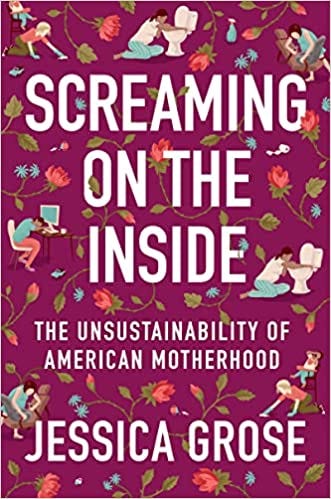I’m so excited to be running a Q&A today with The New York Times opinion columnist Jessica Grose. Grose was one of my first editors at the Times, as she started the excellent Parenting section that launched in 2019. Grose has also written a fantastic book that comes out today (yay!), Screaming on the Inside: The Unsustainability of American Motherhood, which explores how and why mothers are held to such impossible standards — and are provided with so little support — and what can be done about it. In it, Grose also shares her harrowing experiences with morning sickness (including severe vomiting known as hyperemesis), perinatal anxiety and depression.
I was very fortunate to have the chance to connect with Grose last week about her book and ask her about some of its key themes. I highly recommend that you read the entire book to gain a full understanding of how we got where we are today — and what we need to do to make motherhood more sustainable.
Jess, what inspired you to write Screaming on the Inside?
I have been thinking about the ideas in the book for at least a decade, since I had a difficult pregnancy with my older daughter, fraught by hyperemesis and depression. I had to quit a new job because I was so sick, and my life sort of imploded. Despite having so many privileges and otherwise being in good health, it was clear to me then that the structures of our society were not built at all for the reality of motherhood. I have been reporting on these structures and talking to parents in the intervening ten years, and the pandemic really crystalized my thinking in a lot of ways. It made many, many more people realize that the way we have defined motherhood and parenting more generally in the U.S. is not working for a lot of people.
You talk about the conflicting messages mothers have gotten from society over the centuries. Mothers have, for instance, been told that they have lots of power when it comes to shaping who their children become, yet have also been told in many ways that they are weak and incompetent. Can you talk a bit about how these conflicting messages shape our perceptions and expectations about motherhood today?
The idea that everything we do or don't do as individuals could affect our children in a big way is so prevalent. And yet, we don't have the power to make real changes in society that really would help us and our families, like having paid leave.
The example of that kind of obsession with individual choices that I give in the book is what kind of milk you feed your child when you switch from breastmilk or formula. I have heard so many parents, and read so many articles, obsessing about whether it should be whole milk, two percent, or plant milk, and I really empathize with how your children's health can cause a lot of agonizing and anxiety. But the truth is, that is usually a low-stakes decision, and it distracts us from the things that really affect our children's health in a big way, that are mostly out of our control — like the formula crisis. When we obsess over individual choices it also exhausts us and prevents us from agitating about those big things, and organizing about those big things. What a neat trick.
That’s such a good point. What are some of the ways in which social media — and in particular, the rise of the "momfluencer" — make things even worse for moms now?
I'm of the opinion that nothing is all good or all bad. There are many ways in which motherhood is easier now than it has ever been, in terms of convenience and modern medicine.
But, I do think that there is ubiquitous imagery of perfection that is tough to get away from, and that's new. That onslaught of media in our faces. And if we see too much of it, our lizard brains think that's the only way to be, even if our rational brains know that it's all a performance, and that mom wakes up looking like a hot mess or shoved all her dirty laundry into a room she doesn't photograph.
You talk in the book about the value of "accepting and sitting with our ambivalence" toward motherhood. What do you mean by this, and how can we do it?
Ambivalence, in psychoanalytic terms, is not indifference or mixed feelings, as the late psychotherapist Rozsika Parker explained in her book Torn in Two: The Experience of Maternal Ambivalence. Ambivalence means “quite contradictory impulses and emotions towards the same person co-exist. The positive and negative components sit side by side and remain in opposition.” We will feel strong pulls of adoration and rage and every emotion in between. Parker described maternal ambivalence as “normal, natural and eternal.”
So what I mean is that we all have to accept that we won't feel perfect love and sunshine and puppies towards our children 24 hours a day. That's not normal or human. We have to allow ourselves and our friends to have those negative feelings and to not compound the feelings by feeling bad about them. I think that's the key — so many mothers I talked to for the book felt bad about feeling bad.
You make the point that it's hard to get support for better family policies in part because these issues are only relevant to parents for a short period of time. You quote Katha Pollitt's op-ed in the Times about universal daycare in which she writes, "maybe parents are just too tired to fight for it when they need it, and then the kids are in school and they don't need it anymore." How do we overcome our exhaustion and inertia to continue to fight for change?
We accept that we might not be able to fight today, especially if we have super young kids and aren't sleeping. But, we need to remember what this is like, and maybe when our kids are older and we do have the energy, to fight for these policies and go out and advocate for them. I also think that people who are not like us — liberal coastal types for lack of a better way to put it — need to make this case to their own communities. Because they don't care what I think and they probably shouldn't! But these policies are not just policies that benefit people like us, and polling shows they are very popular regardless of political affiliation or background.
What are some things that are making you feel hopeful that positive policy change is on the horizon?
I see something every day that makes me hopeful. As I was editing the book, two more states passed paid leave laws. New Mexico just passed a law to help pay child care providers more. These things don't make front page news across the country, but they're happening all the time if you're looking for them.
Related posts:






